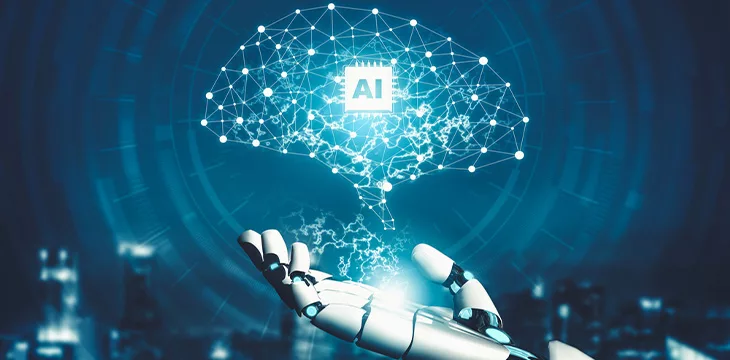|
Getting your Trinity Audio player ready...
|
India’s richest man, Mukesh Ambani, recently said his Reliance Industries would complete artificial intelligence (AI) transformation across all businesses in 2024 in order to become a global leader in AI adoption. That boosted confidence across the Web3 industry in India, signaling hope for faster adoption and bigger investments in the sector.
AI’s adoption received a further impetus in India after Prime Minister Narendra Modi recently said that India is committed to the ethical and responsible use of AI. While Modi acknowledged that AI could potentially transform India’s priority sectors, including healthcare, he has called for a global regulatory framework and a concrete plan to stop the misuse of AI.
“The adoption of AI in India has gone up exponentially,” said Rohan Sharan, founder and CEO of Timechain Labs, an on-chain application development firm utilizing BSV blockchain technology.
Two projects—Indian government-backed AI4Bharat, an AI solution for Indian languages, and BharatGPT integrated for voice modality in over 14 Indian languages —have already seen maximum investments flowing in.
“Those are the two most important projects, and I see more projects following,” Sharan told CoinGeek in an exclusive interview. He pointed out that it is important for AI to represent the interests of people and users.
‘Scratching the surface’
“You will see AI being used in different aspects in the pharmaceutical industry, in research and development, in sectors where you have multiple possibilities,” said Dilip Chenoy, chairman of Bharat Web3 Association, an industry body formed to promote and grow the Web3 industry in India.
“Most of the companies will actually use AI for their products and services,” Chenoy told CoinGeek. Companies will have to invest in developing large language models for their particular applications or get companies to build it for them, he added.
According to Rajagopal Menon, vice-president of WazirX, one of India’s largest digital asset trading platforms, “What you can do is through telemedicine and through AI, you can actually make sure that even the remotest region can get good medical facilities. So the scope for AI, we have still not understood completely. We are just scratching the surface and a lot of these applications that AI will get into, we are not even aware of.”
Menon told CoinGeek, “If you can get the best of content dubbed in multiple languages in real-time, education will take off. So, a guy sitting in the remotest village can listen to and understand MIT lectures in his mother tongue. So we are set up for exciting times ahead and the life that we will be talking about five years down the line will be dramatically different from what it is at this point of time.”
‘AI and blockchain are complementary’
AI alignment, or aligning the interests of AI with the interests of humans, is the biggest problem, Sharan pointed out. That can be solved with blockchain because blockchain technology helps bring traceability to the decisions and actions taken by AI and adds accountability to that.
“So the AI that will be built by leveraging blockchain will have more accountability and be able to prove that they are aligned to the humans representing them, while maintaining the privacy and the traceability of where the content is generated,” Sharan explained.
“Blockchain and artificial intelligence are actually complementary,” added Chenoy of Bharat Web3 Association, stating that the use of blockchain can tackle the issue of AI deepfakes or manipulation of facial appearances.
Deepfakes or AI-generated fake videos raised concerns in India after Sachin Tendulkar, widely appraised as one of the greatest batsmen in cricket history, pointed out a fake video of him promoting a gaming app.
As a result, Indian minister Rajeev Chandrasekhar, on January 16, reportedly announced that India’s government will bring out new information technology rules within one week over growing concerns around AI deepfakes.
30% job displacement in India due to AI
According to an International Monetary Fund (IMF) study, about 40% of jobs globally may be affected due to the influence of AI. The United States of America faces a higher risk at 60%, while that in India is comparatively lower at 30% mainly because India—a predominantly agricultural economy—employs a large number of people and, therefore, is less affected by AI.
“I think AI is going to take most of the customer service jobs. AI can answer queries in a human voice,” Menon of WazirX pointed out. “There are real jobs at risk, but people are going to find more productive jobs.”
“If you remember the 80s and the 90s, Indian bank employees were against computers. But it turned out to be a boon, and instead of sitting and doing the mundane work of entering numbers into ledgers, the computers did it for them, and they moved on to bigger and better things. That’s what’s going to happen with AI as well,” Menon added.
In order for artificial intelligence (AI) to work right within the law and thrive in the face of growing challenges, it needs to integrate an enterprise blockchain system that ensures data input quality and ownership—allowing it to keep data safe while also guaranteeing the immutability of data. Check out CoinGeek’s coverage on this emerging tech to learn more why Enterprise blockchain will be the backbone of AI.
Watch: Timechain Labs Neucron offers users portability

 02-14-2026
02-14-2026 




